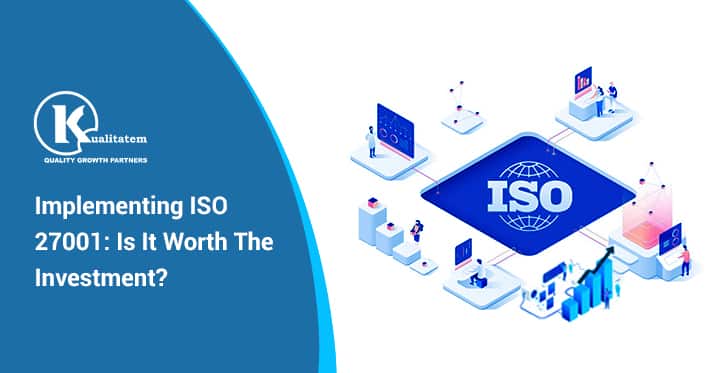Implementing ISO 27001: Is It Worth The Investment?

- October 22, 2020
- HibaSulaiman
ISO 27001 is one of the most popular information security standards around the globe. To ensure the robustness of their information security management systems, organizations are putting efforts to acquire ISO 27001 certification. Earlier, compliance with this standard was a competitive edge for businesses which has now become compulsory for information security systems. Conformity to this standard makes a difference between winning and losing projects for businesses.
Let’s see what ISO 27001 is:
It is the only standard that lays down the specifications for an Information Security Management System (ISMS). In unprecedented times, organizations need to show they can be trusted for IS management. Implementing ISO 27001 shows that an organization has identified risks and placed preventive measures to protect it from information security breaches. It is a standard that adheres to following a risk-based approach to managing people, processes, and technical controls. It vouches for people and technical dependencies to ensure that operational benchmarks can be measured, compared, and improved when security gaps are discovered. This standard is administered with certified practitioners like an independent software testing company offering implementation services for those firms that lack these resources.
Key Benefits of Achieving ISO 27001
Winning and Retaining New Customers/Businesses
The ROI from an ISMS can be relatively higher, businesses can earn initial investments by acquiring external customers. Stakeholders are more interested in how their sensitive information is stored, handled, and protects. The risks posed to cybersecurity and data breaches are so high that customers may not be very comfortable in sharing their critical business information initially.
Organizations are more concerned about the protection of privacy and security of their data from being mishandled. Business owners need to protect their businesses from all aspects including the security of their supply chain. An independent software testing company can align its security priorities with the requirements of their customers, and gain a competitive edge. ISO 27001 certification promises robust security practices, thus improving client relationship and retention.
Preventing Fines and Loss of Goodwill
There are various legislations varying from country to country, that can issue fines to a company’s annual turnover or more for data offenses. These penalties have been issued to ensure data protection and improved information security. In modern times, where cyber attackers are coming up with sophisticated attacks to breach sensitive data, organizations are looking to improve their cybersecurity and also secure their infosec credentials throughout their supply chains.
Even where a firm has incurred a small fine, it has a negative impact on their business while losing their goodwill to the customers. It is an alarming situation for firms to strengthen their information security posture to avoid fines and penalties. They need to have careful consideration with respect to the impact on the reputation of the firms that receive negative publicity due to fines or warning notices. Not only are businesses investing in cybersecurity, but they are also investing in independent software testing firms that are adhering to the security standards.
Compliance with Legal Responsibilities
ISO 27001 also includes an annexure about compliance with legal and contractual requirements. The main objective is to avoid breaches of legal, regulatory, or contractual obligations related to information security. This works as strict control of the relevant legislative, regulatory, contractual requirements and a firm’s approach to meet these requirements should be identified, documented, and updated for each information system. The information system management system makes the compliance side of information security easier. The built-in approval processes make life much easier and offer a plan to comply with IT audit systems. A business that considers the necessary requirements to meet ISO 27001, that can demonstrate to all stakeholders that a business’s future with respect to IS is secure. Thus, the benefits of implementing this standard in an organization are pretty much clear. It improves the ISMS and strengthens the business model.
Improving Business Processes and Strategies
ISO 27001 certification not only improves how clients perceive a business but also improves the company’s internal systems, business processes, and strategies. One of the most important aspects of ISMS is operational procedures and responsibilities. Under this IISO framework, there are requirements related to the processes and documented operating procedures for development and testing, and controls against malware and information backup. It provides a clear framework to consider all the infosec risks such as how IT systems should be kept up-to-date, anti-virus protection, data storage, etc. All such processes that are required to meet this standard result in better documentation and also means that all team members have clear guidelines to follow, which helps secure an organization from any attacks. This may also include policies regarding the use of external drives, safe internal browsing, and strong passwords.
Conclusion
Having said that, cyber-attacks and data breaches can always happen, but the forward planning that involves ISO 27001 evaluates the associated risks and also devises breach reporting plans if things go wrong in any instances. There are numerous benefits associated with ISO 27001 that compel businesses to have a professional information management system. The ROI can be more attractive than most business growth initiatives take. This also occurs if an organization is dependent on having an ISMS that stakeholders and trust, or requires meeting the ISO 27001 standards. Thus, investing in an independent software testing company that complies with ISO 27001 is worth the investment for all scale businesses.











